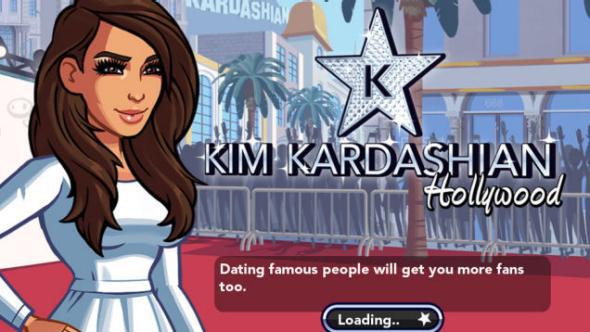It’s not surprising that the mobile game Kim Kardashian: Hollywood is expected to generate $200 million in annual revenue, because Kim Kardashian generates money the way that most people generate carbon dioxide. She earned $28 million in the past 12 months simply by showing up at events, showing up on TV, and showing up (albeit in name only) in Sears and CVS via various Kardashian-branded consumer products. One time, she made $500,000 by going to a party. Another time, she made $500,000 for turning 30.
It is surprising, however, that Glu Mobile’s Kim Kardashian: Hollywood, the top free title in Apple’s App Store as of this writing, has been so warmly received by critics and the general public. The game—in which players trace a celebutante’s ascent from anonymous retail drone to name-brand shower-upper—has tens of thousands of five-star reviews; it’s the only five-star-rated game in the current top 10. On Vulture, Lindsey Weber called KK:H “legitimately good,” a “funny and well-written parody” of Planet Kardashian. Charlotte Alter of Time praised “Kim Kardashian’s genius new game,” hailing Kim as “a Virgil for our time.” Jezebel’s Tracie Egan Morrissey blew nearly $500 on in-app purchases to make KK:H’s version of the A-list and proclaimed it “so fucking fun”—although “in a really terrible, anxiety-ridden, OCD-triggering kind of way.”
I downloaded the app this past Monday evening, the same night that the Environmental Protection Agency bragged on Twitter that it’d made KK:H’s C-list. Having spent the better part of the workweek with it, I agree with the critics that the game is good, but good in such a way that I can’t bear to play it anymore. The latest Kardashian kash kow is utterly hypnotic until the moment that it becomes soul-shreddingly, skull-splittingly boring. That is, weirdly enough, to its credit. The game is a remarkable feat of verisimilitude.
To recap: The journey begins as Kim herself spots you at work in a Los Angeles boutique and offers to set you up with an agent. For the rest of the game, you will pinball between appointments all over L.A., with occasional jaunts to Miami (where Kim may enlist your clothes-folding skills at one of her own shops) or Las Vegas (where you may discover that you don’t have enough money to book the club that Kim recommended for your birthday party). By completing a litany of commands—e.g., “Flirt,” “Check your makeup,” “Get a drink,” “Hold that pose,” “Dazzle the crowd”—you earn money and stars, which in turn you can use to pay for transportation, clothing, and “charm,” i.e., forcing people in higher social echelons to talk to you. (The dollars and stars pour out onto the ground as you earn them, conjuring the appropriately abject image of your avatar crawling around to collect her wages.) To accomplish all this, you need energy, which the game parcels out in lightning bolts. (Jezebel’s Morrissey assumed that the lightning bolts were stand-ins for cocaine; I thought of them as custom-designed Adderall tablets.) You can also purchase units of currency in packages starting at $4.99, which is how this game is going to end up with $200 million in revenue.
With 21st-century shades of Pygmalion and Fitzgerald’s Bernice Bobs Her Hair, KK:H allows Kim to enshrine the lessons of her climb to the top without having to write a memoir. That KK:H has achieved its success by mimicking another Glu Mobile game, Stardom Hollywood, also maps neatly onto Kim’s biography, which itself mimics the template set by her onetime employer Paris Hilton: a voyage from L.A. socialite to sex-tape protagonist to reality-TV star to generalized stander-in-front-of-things. (Unfortunately, there is no sex-tape challenge in KK:H.) What seem at first to be the game’s technical limitations are in fact effective simulations of Kim’s Kim-ness. Your avatar may have no discernible talents and an extremely constricted repertoire of responses (her go-to conversation starter is “Hi!”) and movements (even when “walking” in a fashion show, she hangs around warily at the back of the stage), but damn if she can’t stand up straight for hours, maybe days, in five-inch heels with a blank expression on her impeccably made-up face.
That is the genius of Kim Kardashian: Hollywood: It perfectly captures the hollow-eyed compliant monotony of the very lifestyle it’s espousing. You absorb its value system into your bloodstream on contact. The first big dilemma my avatar faced was deciding whether or not to spend precious Adderall-bolts of energy flirting with a D-list social worker at an overlit and underpopulated party (I didn’t, and shall therefore never know if he was the nephew of a TV executive). Her first major regret was leaving a big tip for a bartender on the hunch that he had “information” (he did not, because he was just a lowly bartender). After a few hours of play, you start to understand how, if you’d been forged in this crucible like Kim and her sisters, you, too, might have turned out just like these sad, tiny people inside your phone. In miniaturizing and cartoon-izing Kim Kardashian and her brethren, KK:H renders them as less cartoonish and more empathetic than they seem in real life. Making millions to stand around doing nothing, saying nothing, thinking nothing—it’s harder than it looks.
